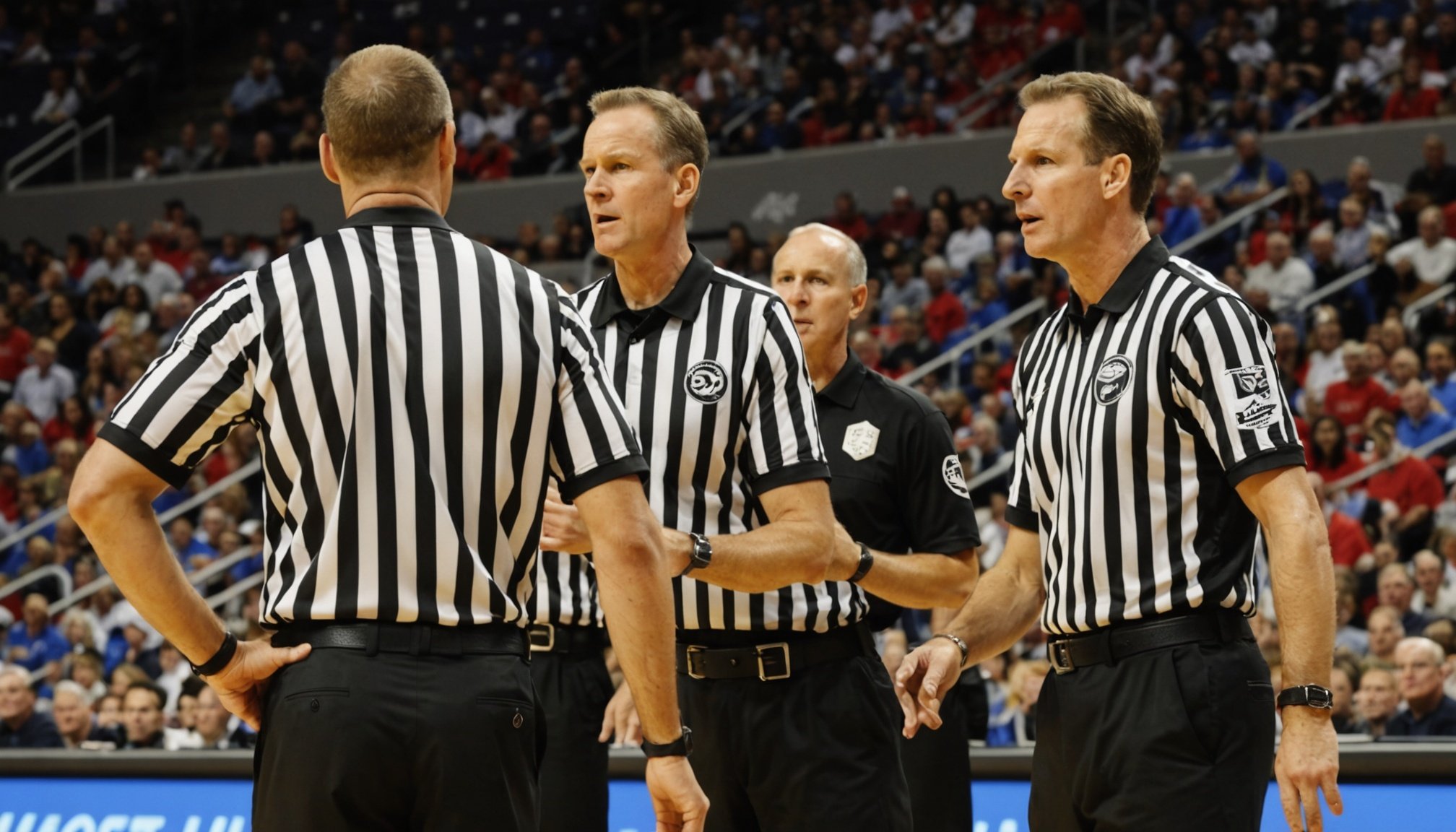Basketball is a beloved sport, played at various levels from amateur school competitions to the high stakes of professional leagues. Whether you are a player, a fan, or involved in the officiating side of the game, understanding how officiating standards differ can enhance your appreciation for the sport. In this article, we will explore the contrasting rules, responsibilities, and challenges faced by officials in professional and amateur basketball games. This understanding is crucial not just for those who officiate, but also for players and coaches who seek to navigate the complex world of basketball with clarity.
The Role of Officials in Professional and Amateur Basketball
In both professional and amateur basketball, the primary role of officials is to enforce the rules of the game. They ensure fair play, maintain order, and manage the flow of the game. However, the context in which they operate, and the expectations placed upon them, can differ significantly between the two settings.
Also to discover : What are the historical influences that shaped modern basketball as we know it?
In professional leagues such as the NBA, the officiating team consists of highly trained individuals who often officiate at an elite level. They are expected to have an in-depth knowledge of the game, including nuances that might not be as vital in amateur settings. Professional officials are typically full-time professionals, undergoing rigorous training and evaluation, and they are well-versed in using advanced technology to support their decisions. For instance, they might utilize instant replay systems to review contentious calls, which is less common in amateur settings.
On the other hand, amateur basketball, including school and college games, often relies on part-time officials who may not have the same level of training or experience. Many are volunteers or local referees who officiate games as a side job. While they still uphold the essential rules of basketball, the lack of advanced technology and support can make their job more challenging. They might not have as much time for preparation or ongoing training, leading to variations in how consistently rules are applied.
Have you seen this : How can a strong work ethic influence a basketball player’s career trajectory?
Overall, the role of officials remains crucial in both contexts, but the professional landscape demands more stringent standards, greater accountability, and a higher level of expertise. Understanding these differences helps players, coaches, and fans appreciate the intricacies of the game and the people who facilitate it.
Differences in Rules and Regulations
While the core rules of basketball remain constant, various leagues and associations may implement different regulations that affect how the game is officiated. This distinction is particularly evident when comparing professional games to amateur competitions.
In professional basketball, the NBA has established a comprehensive set of rules that account for the unique dynamics of the game. These include specifics about player conduct, fouls, and game management strategies. For example, the NBA employs a stricter interpretation of certain fouls, such as flagrant fouls, which can lead to immediate ejections and suspensions. Additionally, the professional game allows for a more sophisticated approach to gameplay, such as the use of defensive three-second violations, which is not typically enforced in amateur leagues.
Conversely, amateur basketball associations, including those at the high school and college levels, often follow rules set by bodies like the NFHS or NCAA. These organizations provide guidelines that reflect the developmental stage of the players. As a result, the rules may vary slightly, with certain allowances made for younger or less experienced players. For instance, the three-point line is closer in many amateur leagues, and fouls may be assessed differently, focusing on promoting player safety and fairness.
These variations in rules also mean that officials in amateur basketball have to be adaptable. They must understand and apply the specific regulations of the league they are officiating, sometimes requiring quick adjustments after being assigned to different levels of play. This adaptability is less of a concern for professional officials, who consistently apply NBA rules across all games. Overall, while the fundamentals of basketball remain intact, the differences in rules and regulations between professional and amateur games reflect the varying contexts and player experiences.
Training and Development of Officials
Training and development are critical aspects of officiating, and there are notable differences between how professional and amateur basketball officials are trained. In professional settings, officials often undergo extensive training and continuous development to maintain their proficiency in the rules of the game. They participate in workshops, seminars, and regular evaluations to refine their skills and stay updated on rule changes or enforcement strategies. The NBA, for instance, has a robust training program that includes mentorship from experienced referees, providing a pathway for aspiring officials to climb the ranks.
In contrast, training for amateur officials can be less formal. Many local associations might offer basic courses or clinics on the rules of the game, but the depth and frequency of training can vary widely. Some officials may receive just a few hours of training before they are qualified to officiate a game, which can lead to inconsistencies in the application of the rules at the amateur level. This is particularly relevant in school settings, where volunteers often step up to officiate without extensive backgrounds in the sport.
Furthermore, the emphasis on training and development in the professional realm also translates to resources available for feedback and improvement. Professional officials receive video reviews of their performances, allowing them to analyze their decision-making processes and develop a keen sense of judgment. This is crucial in a fast-paced sport like basketball, where split-second decisions can change the outcome of a game.
In summary, the differences in training and development between professional and amateur officials highlight the varying levels of preparedness and expertise in officiating basketball games. While professional officials benefit from structured training and ongoing support, amateur officials often rely on limited resources, impacting their ability to enforce the rules effectively.
Challenges Faced by Officials in Different Settings
Officials in basketball face a myriad of challenges, but these can vary significantly depending on whether they are officiating a professional or an amateur game. In a professional context, one of the foremost challenges is the intense scrutiny from players, coaches, and fans. Every call made by an official can be analyzed and criticized, especially in high-stakes games where the outcome is pivotal. This pressure can be overwhelming, as professional officials must maintain their composure and confidence in their decision-making despite potential backlash.
In addition to scrutiny, professional officials often deal with the complexity of game management at a higher level. They must make quick decisions on fouls, violations, and out-of-bounds plays while managing the dynamics of elite athletes who may react emotionally to calls. This requires a high degree of situational awareness and interpersonal skills, as officials must communicate effectively with players and coaches to diffuse tensions.
Conversely, amateur officials face different challenges. One significant hurdle is the lack of experience and training. Many officials in amateur settings may be new to officiating or may not have extensive basketball knowledge, leading to mistakes that can impact the flow of the game. This inexperience can result in increased pressure from parents and coaches, who may have high expectations for how the game should be officiated.
Moreover, amateur officials often work in environments where the stakes are less rigorous but can still be emotionally charged. Youth and school games can be just as passionate, with parents and friends vocally supporting their teams. This can create a challenging atmosphere for officials, who must manage not only the game but also the reactions from the sidelines. The need for strong communication and conflict resolution skills is paramount, especially in environments where the level of respect for the officials may not always be present.
In conclusion, both professional and amateur officials encounter unique challenges that shape their experiences on and off the court. Understanding these challenges can foster greater respect for the officials who play an essential role in the game.
As we’ve explored, the standards of officiating in basketball are shaped by the context in which the game is played. Professional officials operate under a demanding framework with rigorous training, advanced technology, and high stakes, while their amateur counterparts navigate a landscape that often lacks the same resources and support. This distinction highlights the importance of officials at all levels and the significant role they play in maintaining the integrity of the game. For players and coaches, understanding these differences can foster a deeper appreciation for the sport, encouraging respect for those who dedicate their time to officiating. Whether you are a player aiming to improve your game or someone considering a role as an official, recognizing the nuances of officiating standards is vital to enhancing your basketball experience.











